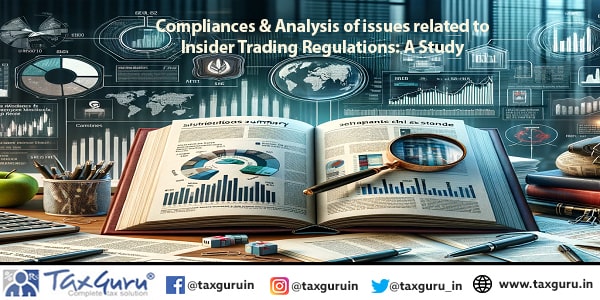Introduction
Insider Trading in India is a bone of Contention since a long time in India and all over the Globe. Insider Trading has become the trend in the current era in most of the Developed Countries like USA, Australia,. UK etc. This article will consist mainly about the Insider trading legislations with a simple comparative analysis with the laws of USA and UK and how successful we are in terms of regulating these malpractices. Although it is usually misinterpreted that Insider Trading is a Illegal Practice but it is not always true, there are 2 kinds of Insider trading one which is legal and the later which is Illegal and has legal compliances attached with the same.
Usually Illegal Insider Trading happens whenever there is information shared by the Insider to a person who is not directly related to the company’s management but does hold shares of the company. Who is an Insider when we deliberately talk about it, It has always been into debate it can be the person who might have access to the information of the company who is oftenly in the senior officials of the Company or it can be also be someone who is not really connected with the high level meetings of the Company but have connections with the officials of the company.
Legislations related to Insider Trading in India
In India, insider trading is regulated primarily by the Securities and Exchange Board of India (SEBI). The regulatory framework aims to maintain the integrity and fairness of the securities market by preventing unfair trading practices. The key legislation addressing insider trading is the SEBI (Prohibition of Insider Trading) Regulations, 2015. These regulations define insiders, specify the code of conduct for them, and outline stringent norms for the disclosure of unpublished price-sensitive information.
Insiders are prohibited from trading in securities while in possession of unpublished information that could impact the stock prices. The regulations also mandate the establishment of a code of conduct for listed companies to govern their employees and other connected persons. SEBI is empowered to investigate and penalise violations, with sanctions ranging from monetary fines to debarment from trading in securities. The regulations have been periodically updated to enhance transparency and deter illicit practices, reflecting India’s commitment to fostering a fair and robust securities market.
Insider trading poses a significant challenge to the integrity of financial markets, as individuals with privileged information can exploit it for personal gain, causing market distortions and unfair advantages. In India, the Securities and Exchange Board of India (SEBI) has implemented stringent regulations to combat insider trading and ensure fair and transparent markets. This study delves into the enforcement mechanisms established by SEBI, focusing on the analysis of compliances and key issues related to insider trading regulations in the country.

SEBI (Prohibition of Insider Trading) Regulations, 2015
The cornerstone of insider trading regulations in India is the SEBI (Prohibition of Insider Trading) Regulations, 2015. These regulations provide a comprehensive framework for preventing insider trading activities and promoting fair market practices. They outline the obligations of various market participants and establish mechanisms for effective enforcement.
Code of Conduct
To ensure compliance with insider trading regulations, companies are required to formulate and implement a robust code of conduct. This code encompasses a range of practices, including the pre-clearance of trades, reporting obligations, and the maintenance of an effective insider trading policy. It serves as a guiding document for employees and other designated persons within the organisation.
Insider Trading Clearances
SEBI regulations mandate that designated persons, such as key managerial personnel and employees with access to unpublished price-sensitive information, obtain pre-clearance from the compliance officer before engaging in any trading activity. This process acts as a preventive measure, ensuring that trades are conducted in a transparent and compliant manner.
Surveillance and Monitoring
SEBI employs sophisticated surveillance mechanisms and technology to monitor trading activities in the securities market. Unusual patterns and suspicious transactions are closely scrutinised to identify potential instances of insider trading. The regulatory body’s proactive approach in surveillance plays a crucial role in maintaining market integrity.
Whistleblower Mechanism
Encouraging the establishment of effective whistleblower mechanisms is a key aspect of SEBI’s strategy to combat insider trading. This mechanism allows employees and other stakeholders to report instances of potential violations confidentially. Whistleblower reports provide valuable leads for investigations, contributing to the overall effectiveness of the regulatory framework.
Investigative Powers
SEBI possesses extensive investigative powers to inquire into allegations of insider trading. These powers include the authority to conduct inspections, order forensic audits, and summon individuals for information. The regulatory body’s ability to conduct thorough investigations is essential for uncovering potential violations and taking timely corrective actions.
Penalties and Prosecution
SEBI has the authority to impose significant penalties on individuals found guilty of insider trading. Penalties may include fines, disgorgement of profits, and debarment from trading in the securities market. The severity of these penalties serves as a deterrent, discouraging market participants from engaging in illicit activities.
Adjudication and Appellate Process
To ensure a fair and transparent adjudication process, SEBI has established an adjudication mechanism to hear cases related to insider trading violations. Individuals subject to SEBI orders also have the right to appeal to the Securities Appellate Tribunal (SAT). This appellate process provides an avenue for a thorough review of SEBI’s decisions.
Conclusion
SEBI’s enforcement mechanisms play a pivotal role in maintaining market integrity and instilling confidence among investors. Through a combination of regulatory frameworks, proactive surveillance, and robust investigative powers, SEBI strives to create a level playing field in the Indian securities market. As the financial landscape evolves, ongoing studies and analyses of compliance issues contribute to the refinement and effectiveness of insider trading regulations in India.




